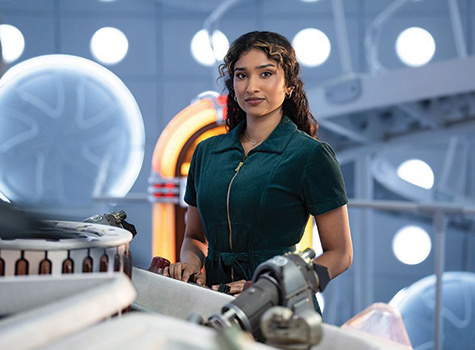By Jennifer Allen
“For five hundred years, every ship that has borne the name of the Enterprise has become a legend. This one is no different.” ~ Admiral Nakamura (Episode: The Measure of a Man)
As a kid, I was often subjected to an hour of the original Star Trek every weekday thanks to my mother having it on for “background noise” while doing housework. A show that originally only lasted three seasons would never be considered for syndication today, but in the 70’s and 80’s it was one of the many mainstays for TV to fill space before dinnertime.
By early 1987 the only “new” Star Trek we had known was in the form of the 4th feature film with Kirk and crew heading back in time to fetch some Humpback whales to save the Earth. We had just gotten our fill of saving the environment and “Nookleear Wessles” when we heard the announcement that Gene Roddenberry’s next task was to bring Trek back to TV with a new cast.
I was 13 when this news first hit and I’ll admit I was both excited and skeptical that this would actually work. After all the original show had its own ups and downs both on and off screen. Would a new crew and a new Enterprise be capable to fulfill what the original cast and starship had done?
September 28, 1987 finally arrived and we all sat down to watch the 2-hour premiere of Encounter at Farpoint. We were suddenly swept into a world that was set 90 years after the original Enterprise NCC-1701 and crew’s first appearance. The NCC-1701 D was a Galaxy class starship launched from the Utopia Planitia Fleet Yards on time. The Federation’s new flagship was definitely a sight to behold. She was bigger, better, faster and loaded with extravagant technological capability – not to mention firepower and the capability to split in two.
Many new concepts were added in this new iteration as well. Families were on board since they knew the voyage could take them away from loved ones for extended periods of time. We had a widowed mother (Beverly Crusher) there with her young son (Wesley) and we watched as she raised him on her own. We had our first female Security Chief with Tasha Yar. We were introduced to an artificial life form with Data. A Klingon who was a member of the crew in Worf. A crew member who was disabled but never let that obligate his duties in Geordi LaForge. Most importantly we had an older Captain who was more of a philosopher and poet than his predecessor in Jean Luc Picard.
“It is possible to commit no mistakes and still lose. That is not weakness; that is life.” ~ Captain Jean Luc Picard (Episode: Peak Performance)
In 1987 we had no idea if this new show would stick or if it would disappear like the original. For the first few seasons it was certainly rocky. In all honesty, I can count on one hand how many good episodes there are in seasons 1 & 2. The one that stands out the most is The Measure of a Man where Data is placed on trial to determine whether he is a sentient being able to make his own decisions… or if he is a piece of Federation property. It was, in my opinion, the first time that TNG really stood out as both rooted in Gene’s vision and yet moving into its own. Once this episode aired, I knew that Next Gen had made its official stamp on our culture and would continue to do so.
Over the next few seasons, Picard and crew would tackle many topics. Overcoming physical disability, gender identity & LBGT issues, alien first contact, Alzeimer’s disease, individualism, PTSD, cultural oppression, and various forms of addiction were a few of many topics addressed over the show’s seven seasons.
The show also had a nice series of callbacks to the original series with a lot of writers, directors and characters returning. Most notable were the episodes with Spock, Sarek and Montgomery Scott. To this day I can still remember Scotty’s advice to Geordi about never telling your Captain how long it would really take to fix a problem, hence why he was known as the ‘Miracle Worker’.
“Starfleet captains are like children. They want everything right now and they want it their way. But the secret is to give them only what they need, not what they want.” ~ Captain Montgomery Scott (Episode: Relics)
TNG would continue to improve in story and scope throughout its next few seasons, though part of that reason was Gene Roddenberry’s declining health. I still remember to this day, how I reacted to his passing in 1991. It was both very sad but also a bit of fresh air at the same time. The man was by no means perfect, to be sure. It’s plain that the first few seasons were more sterile than the latter ones, mostly due to his role as executive producer and creator. I wish I couldn’t say that Gene’s passing made the show better, but it did. The storylines got grittier, the main characters got more complex, and the villains got a lot more interesting.
Everyone who has watched The Next Generation has their favorite episode (or more). For me I have several. The aforementioned The Measure of a Man is one. The Best of Both Worlds where Picard joins the Borg is another. The Offspring where Data creates a “child” is yet another. However, there is just something completely amazing about the 5th season episode, The Inner Light. The episode shows Picard in an alternate life due to a probe from a lost civilization on a dying planet. The episode not only changed Picard as a person and a character, but it also had such a great message not only about the environment but also about passing on the memories and experiences of the past and living life to its fullest while you can. This was an incredibly important message to me, as the episode originally aired the same week that I graduated from high school.
The greatest thing for me is Gene Roddenberry’s Star Trek as a whole embraces a future of unlimited possibilities using 20th century science to “make it so” in the 24th century. We now are on our way with so many technologies from the show now becoming a reality. I still think the core of Star Trek, and especially The Next Generation was its heart. Captain Picard’s TNG crew hopping from planet to planet was the New Star Trek in 1987, and now we await a Star Trek for a whole new generation with Star Trek: Discovery. I know I’ll be there watching just like the 13-year-old me did 30 years before.



